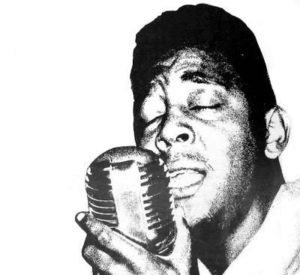A long time ago, in a galaxy far away, I was digging through some crates when I came across a record with a title that intrigued me by a group with a cool name. I didn’t know anything else about the song or the group but I bought the single that day and I still have it. It was something called “Uhh” by Dyke & the Blazers. My research tells me it wasn’t their biggest hit but that doesn’t make it any less of a cool record.
In the beginning, there was a guy with the somewhat unwieldy name of Arlester Christian in Buffalo, NY. Early on he took on the much simpler nickname, Dyke. At first, he was a bass player, working with a local group called Carl LaRue and his Crew. Somewhere around 1963 Carl and his Crew released a single on the KKC label called “Please Don’t Drive Me Away.” I’ll bet that one isn’t easy to find.
Meanwhile, clear across the country, there was a DJ called Eddie O’Jay and he managed a group called, that’s right, the O’Jays. Somehow O’Jay had become aware of LaRue and invited him to bring his band to Phoenix to back the O’Jays. Unfortunately, by the time the Crew made it out there in 1965, the O’Jays had departed for greener pastures. End of band.
Finding themselves without the means to go home, Christian and two other members of the Crew, guitarist “Pig” Jacobs and sax player J.V. Hunt, decided to stay in Phoenix. At the time there was a local group there called the Three Blazers and when they joined forces with the stranded Crew members they became Dyke and the Blazers. The rest of the lineup included Bernard Williams on sax, organist Rich Cason, and drummer Rodney Brown.
The new group played in the Phoenix clubs and they loved to jam. Out of one of those jams emerged the riff that became “Funky Broadway.” Most people probably think that the lyrics were inspired by the Great White Way in New York City, but in truth, Christian was thinking of Broadway in his Buffalo hometown and Broadway Street in Phoenix when he wrote it.

Enter Art Barrett. He heard the band, and he liked what he heard enough to become their manager. He quickly got them into a studio to record “Funky Broadway” and released it on his own label, which was called Artco. It was a big enough hit to get the band started, reaching the Top 20 on the R&B chart and crossing over to #65 on the Billboard Hot 100. The success came despite the fact that some radio stations banned the record because of the word “funky” in the title. Yes, you read that right.
Bass player Alvin Battle was added to the lineup to allow Christian more freedom as the lead vocalist. The success of the single led to a lot of touring for the group including stops at the legendary Apollo Theater. But the stress of touring got to them and by 1967, Dyke & the Blazers had broken up. Right after their split, Wilson Pickett released his version of “Funky Broadway” which of course was an enormous hit, #1 on the R&B chart and Top 10 on the pop chart.
Christian wasn’t done, however. He went back to Buffalo and put a new band together to back him. The second band included drummer Willie Earl who had been part of LaRue’s Crew, along with another drummer, “Baby Wayne” Peterson. Otis Tolliver played bass, Ray Byrd was on keys, and “Little Mo” Jones played trumpet. But the new lineup didn’t last, falling to pieces by 1969.
Instead of putting together yet another band, Christian moved to LA where he put out Dyke & the Blazers records that he recorded with session musicians. Those session musicians, by the way, eventually became known as the Watts 103rd Street Rhythm Band. Among the musicians was drummer James Gadson, who played with Bill Withers, and Al McKay and Roland Bautista, both guitarists, who later played with Earth, Wind & Fire.
Several successful singles resulted from this collaboration including “We Got More Soul, and “Let A Woman Be A Woman, Let A Man Be A Man.” The singles tended to be long jams that were edited down for radio play. Yes, “Uhh” was one of their singles too, but it didn’t make it into the Top 100 in 1970, and neither did two subsequent singles.
Things did not end well for Arlester “Dyke” Christian. He was getting ready to tour England and to do some recording with Barry White when he was shot dead on a Phoenix street in 1971. Some people tried to make it a drug thing but an autopsy showed neither alcohol or drugs in Christian’s body. A man named Clarence Daniels was arrested for the killing but the charges were dismissed citing evidence of self-defense.
Christian was buried back home in Buffalo.





Comments